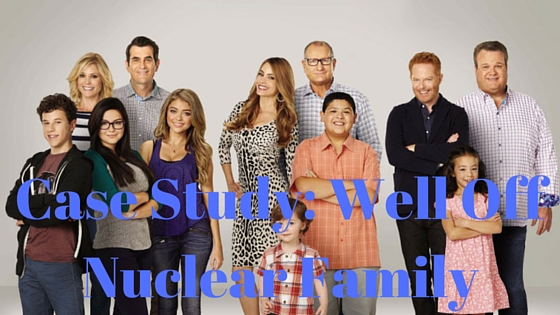Case Study: Estate Plan for well-off Nuclear Family
Phil and Claire are married. They have three children, two to whom are still minors; Hayley, Alexis and Lucas. Most of their assets are jointly held: their house and bank accounts. Phil has a thriving real estate business in his own name. The total value of their assets are $5,000,000 including superannuation. Phil also has a $500,000 life insurance the total and permanent disability insurance cover.
If either Phil or Claire were to die, their joint assets would automatically transfer to the survivor. They do binding death benefit nominations with their superannuation funds for the funds to be paid into their estate, and then they leave everything to each other via a testamentary trust (instead of outright, to obtain the tax benefits and asset protection).
 If both Phil and Claire die, they decide to appoint Jay and Mitchell as their executors. They nominate Jay and Gloria to be the guardians of their minor children. Jay has a very good business brain, but because there are minor children there should be more than one executor. Mitchell is preferable as the other executor instead of Gloria, because Mitchell will add a control and balance to Jay. If Jay and Gloria were both executors and guardians, there is room for foul play.
If both Phil and Claire die, they decide to appoint Jay and Mitchell as their executors. They nominate Jay and Gloria to be the guardians of their minor children. Jay has a very good business brain, but because there are minor children there should be more than one executor. Mitchell is preferable as the other executor instead of Gloria, because Mitchell will add a control and balance to Jay. If Jay and Gloria were both executors and guardians, there is room for foul play.
Phil and Claire decide toe put $500,000 aside into an education trust for their children. The vesting date for the trust is after Luke attains the age of 25 years. After vesting, the balance remaining gets divided equally amongst the children (into their trusts). But this ensures that money is set aside to be used for education.
The balance of their joint estate would be left equally to their children in individual testamentary trusts that they would be able to control from the age of 25 years. Until that time, Jay and Mitchell will control their trusts.
Usual provisions are included in their Wills that if any of their children predecease them, leaving children, then their children (Phil and Claire’s grandchildren) would take the share that their parent would have otherwise taken. If a child of theirs dies without have had children, then the estate just gets divided between the surviving children.
They also make provision for an accident in which all of them should die, as they do regularly travel together. Phil and Claire would want half of their estate to go to Mitchell and Joe (Claire’s minor half-sibling), and the other half to Phil’s siblings equally.
Going through this process with Phil and Claire has also raised issues as to what would happen with Phil’s business if he were to die. Is Claire capable of running the business until she can sell it, or are there employees who can run the business whilst Claire maintains ownership? Phil may need to consider key-person insurance for the business, so that Claire could hire someone to take his place until she can come up with a solution.





It may be possible to retain the community property nature of the assets by simply segregating them from other assets on arriving in the new state, but the estate planning documents that dispose of the segregated assets should provide for the disposition of only one-half of the assets at the death of each spouse.
The next important step in planning her estates is to know what kind of will that is necessary for her situation.